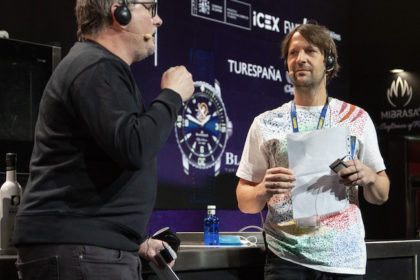
Expect more changes to fine dining as the restaurant industry grapples with Covid-19 changes, casual eateries adapt more fine dining techniques and the war in Ukraine continues to affect the world economy.
“Everyday restaurants have become so amazing. It’s not like it used to be, you used to go to the best restaurant to get the most tender piece of meat and the perfect ice cream,” says Rene Redzepi. He is the founder of Noma, the Michelin three-star restaurant in Copenhagen lauded as one of the top in the world. “You can find typical luxury ingredients like caviar and wagyu in airports. The quality of cooking now is so high.”
Redzepi spoke at Madrid Fusión, one of the largest and oldest international gastronomy conventions. Andoni Luis Aduriz, chef and owner of the renowned Spanish restaurant Mugaritz, spoke with Redzepi.
Redzepi says there’s been a “flavor spread” or “quality spread” of gastronomy techniques. He points to espumas, the Spanish term for culinary foaming. – now used on every continent, in every level of restaurant. A gourmet dish may come from the neighborhood brasserie, a tapas bar or even a food truck. It’s “dramatically changed” the restaurant industry, he notes.
“That’s because people don’t understand the influence and the philosophies that [are] now completely naturalized in every corner of gastronomy,” he says. Techniques once used only in premier establishments have become part of cooking DNA. “I hope fermentation will be that because I genuinely believe in the power of that.”
When Noma opened in November 2003, Redzepi promised Nordic cuisine made with local produce. But it was winter and freezing, making sourcing food a challenge, “so I stepped into the wilderness to find flavors.”
He also realized Noma needed to conserve summer produce for the long winter.
“We started to use pickling, fermentation, drying, smoking. Twenty years later, we have this bank of knowledge,” he said. “Before, we used to try 20,000 different fermentation techniques, now we are trying one at a time, with the whole team, like we are doing with lacto-fermentation.”
Fermentation drives an enormous amount of innovation at Noma. Redzepi told the Madrid Fusion audience that the restaurant industry is one of the most difficult to work in, so innovation and experience are what drive profitability.
“That’s what makes it special, putting together a team, while constantly looking for the ‘next big thing,’” he says. “That’s where the challenge is; pushing yourself outside of your comfort zone, until you have no clue what you’re doing, but as a group, you draw on your experiences, you trust each other, and you dare to move onwards.”
Redzepi praised the current state of Spain’s cuisine, saying “the Spanish influence is a natural part of any fine dining kitchen in the Western world.”When he was starting out in the 90s, French food was the only focus for chefs. “You were going to cook French food in Denmark, that’s what I always thought to myself.” But when he took a job cooking in Spain for a season, “it was like everything that you had been taught before, all your rules that you knew, were sort of thrown away and you could build and dream in a different way. “[Spanish cuisine] has given me the very seed of everything that’s become Noma.”
